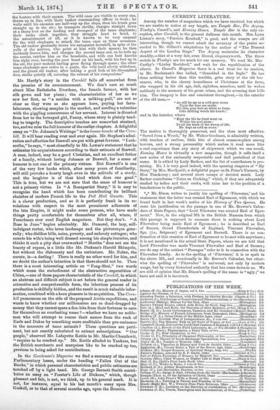CURRENT LITERATURE.
Among the number of magazines which we have received, but which we are unable to notice at any length, are Temple Bar, The Argosy, Tinsley's, Gases/i's, and Evening Hours. Temple Bar is the only ex- ception, after Corn/till, to the general dullness this month. Mrs. Lynn Linton's story, "Patricia Beruball," is good, and the essays are all interesting, though we cannot admit the accuracy of the praise ac- corded to Mr. Gilbert's adaptations by the author of "The Present Aspect of the London Stage." The Argosy maintains its character steadily,—that of a very fair, even liberal, sixpennyworth. The three serials in Tinsley's are too much for our memory. We read Mr. Mac Carthy's "Linley Rochford," and wait for the republication of the others. In Cases/i's Magazine there is a real treat for its readers, in Mr. Bnchanan's fine ballad, "Granddad in the Ingle." He has done nothing better than this terrible, grim story of the old bac canner, who, in the cheery homeliness of Christmas at the farm, sits wrapped in his old age, dull, sightless, senseless, until he wakes suddenly to the memory of his great crime, and the arousing dart kills him. The imagery is fine and consistent throughout,—in the exterior of the old man,— "As still he sat as a cold grey stone Upon the lone sea sands, His thin grey hair as white as foam, Like drifting weeds his hands
and in the interior, where
Ever the life he lived went on Within his soul alone ; To all the wash of the waves of life, He kept as cold as stone.''
The motive is thoroughly preserved, and the close most effective. "Saved from a Wreck," by Mr. Walter Goodman, is admirably written, with touches of 'realism, little bits of almost common-place among horrors, and a strong personality which makes it read more like a real experience than any story of shipwreck which we can recall. Evening Hours is virtually a new magazine, though it calls itself a new series of the eminently respectable and dull periodical of that name. It is edited by Lady Barker, and the list of contributors is pro- mising. No. I is very good indeed, with the opening chapters of "My Story," by Mrs. MacQuoid; a delightful paper on St. Peter's Nursery, by Miss Thackoray ; and several short essays of decided merit. Lady Barker contributes "Notes on Cooking," which, if they are adequately studied by ladies and their cook; will raise her to the position of a benefactress to the public.
































 Previous page
Previous page